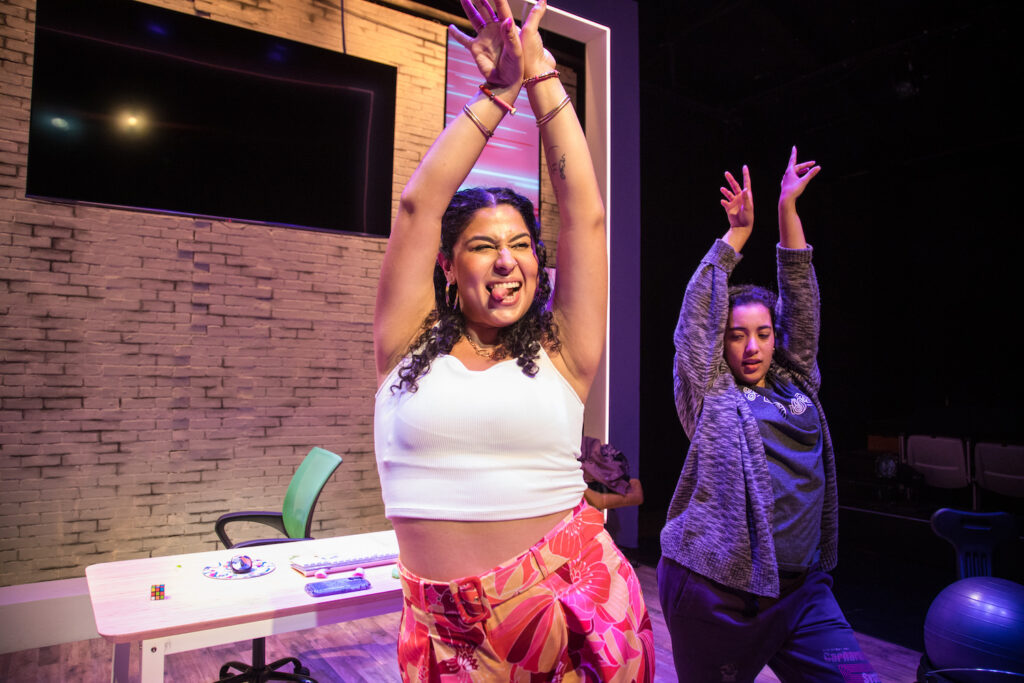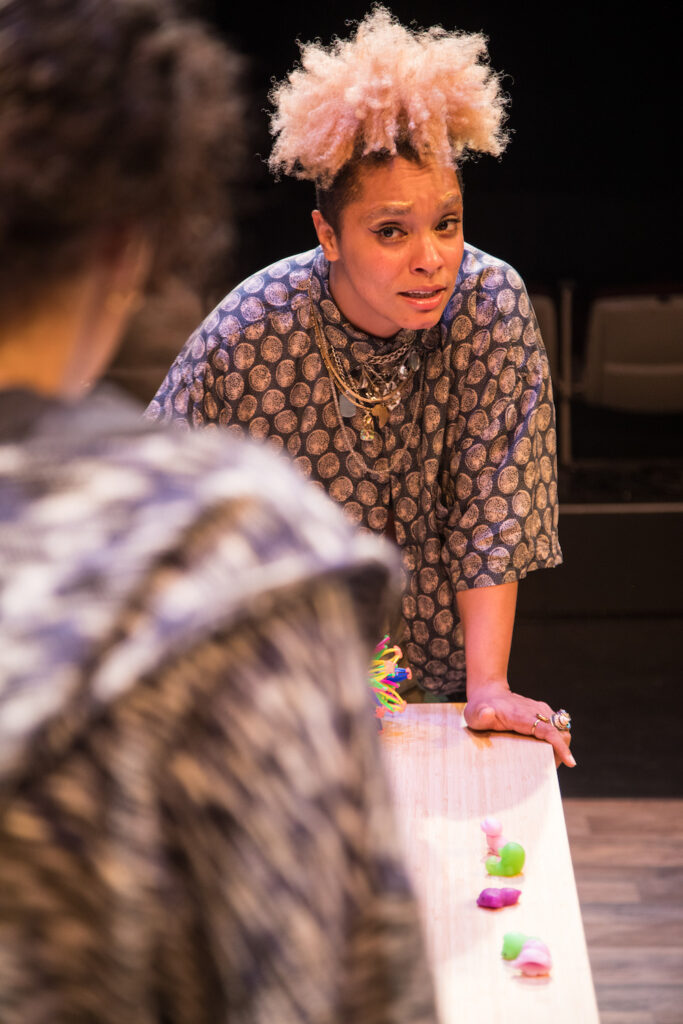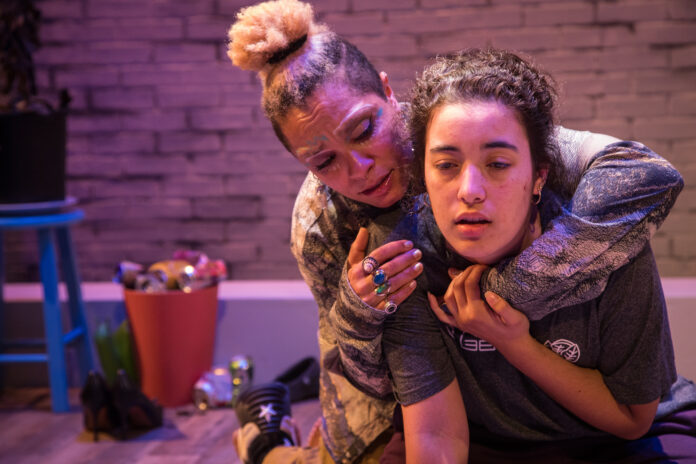Crowded Fire’s latest show took an unexpectedly long trip to the stage. The company’s last full production was the 2021 gentrification-horror story The Displaced, and further pandemic complications continue to delay their world premiere of Star Finch’s Shipping & Handling. When they were finally ready to stage Mary Glen Fredrick’s Edit Annie (West Coast premiere through October 15 at Magic Theatre, SF), it’s early-October opening date had to be pushed back for health concerns related to Northern California wildfire smoke. At the new opening, we were told during the curtain speech that the title character, normally played by Monique Crawford, would be filled that night by co-director Leigh Rondon-Davis.
After all those hurdles, we should at least be glad that the show itself is good. I’d hate to think that they went through all that mishegas for the sake of something that’s a chore to sit through. Fortunately for us, their “queer rom-com/psychological thriller” is able to hold our attention. Granted, some may attribute that to the loud noises and flashing imagery (shades and ear plugs are offered before entry), but the story’s got merits, too.
Said story includes online influencer Clara Couture (Jordan Maria Don), a personified smiley emoji who spreads positive vibes and hawks appetite-suppressing lollys through brightly-colored videos; they occasionally feature her boyfriend Jackson (Kenny Scott). Those aforementioned visuals are provided by the eponymous Annie, a skilled digital editor who’s been pretty introverted since breaking up with Dana (Chibueze Crouch) four months prior. Sure, this allows Annie time to throw herself head-first into her work, but that’s a poor substitute for an actual relationship.

After four months as a digital hermit, Annie ventures out into the world to get a latte. To her absolute shock, the patron waiting in front of her is none other than Clara, the woman whose image Annie helped mold into the lucrative online personality it is today. The thing is, Clara’s never met or seen Annie, so when the overly-excited-editor-with-poor-social-skills (a later scene hints that she may or may not be on a spectrum) tries to introduce herself to the semi-star, Clara thinks she’s being cornered by a stalker. One trip and fall by Annie later, and she’s calcified her worst day ever.
Lucky for her, she seems to recover in more ways than one: when the café encounter goes viral, Clara suddenly wants to get to know this eccentric stranger who happens to be her employee. Things seem to be looking up for Annie. But as someone who makes her living manipulating public images, she soon finds out that there’s a world of difference between who someone really is and whom they present themselves as.
If there’s one thing to appreciate about Frederick’s script, it’s the way it speaks from a Gen-Z point-of-view without feeling forced. I’ve lost count of the number of plays, films, and tv shows for which the commentary about “the kids today” is akin to Mr. Burns entering Principal Skinner’s office dressed as Jimbo. Annie saying “OK, Boomer!” to Dana feels organic rather than something the author picked up from a sitcom. Similarly, the YouTube aesthetics (shot, edited, and designed for this production by Frederick herself) nail the appropriate look of the format. Hell, as an aficionado of film and video formats, I appreciated Annie’s monologue about NTSC 30 frames vs. PAL 25 frames.
More importantly, Frederick’s script feels timeless in its examination of feminine scrutiny by the world at large—a scrutiny that seems to have gotten worse in the digital age. A tense moment late in the play’s latter scenes involves Clara asking, then insisting, that Annie add an app to her software to make Clara appear thinner. Clara’s at peace with her status as a shameless capitalist (at one point saying “I honestly love capitalism!”), which deeply shakes Annie—who, as Clara points out, gets paid by the same snake oil-sellers that advertise with Clara. But how does one draw a line in the sand without sentencing themselves to poverty? We’ve seen what capitalism does to the non-rich; can you blame someone for wanting to avoid that?

A lot of credit has to be given to co-director (with Nailah Unole Dida-nese’ah Harper-Malveaux) Rondon-Davis, who did a good 80-or-so-per-cent of the show without calling for lines or looking at the script she had. Davis has given strong performances before, such as in Shotgun’s production of The Light, but Annie is not only omnipresent on stage, she is, by her own admission, a bundle of undiagnosed conditions colliding together. Rondon-Davis conveys them well. Equally compelling is Don as Clara, able switch from “mask-off” to smiley with the skill of a seasoned politician. Though one may despise influencers, Don makes it easy to see Clara’s appeal to her one million followers.
One collaborator whose praises must be sung is set designer Ashley Méndez. Her design of Annie’s brick-walled loft should be familiar to anyone who’s been in a start-up, and the way the four plasma screens appear to float in mid-air is impressive. Yet the stage holds its biggest secret for the play’s climax, in which the walls of reality seem to disappear both literally and figuratively.
Another element I appreciated was Crowded Fire’s continued insistence on masks, a mandate that was actually followed by all who attended opening night. Over the course of the 90-min show, my Aranet4’s CO² readings topped 1642ppm, which isn’t bad for the Magic stage.
It’s been a long road to get Edit Annie on its feet, but the final result is well worth it. Potential patrons should be warned of the sensory overload it presents, but it’s all done with solid purpose and in service to the story. An amusing and horrifying story by and for the TikTok generation, the play is visceral in its immediacy and one of the best shows I’ve seen this year.
EDIT ANNIE West Coast premiere runs through October 15 at Magic Theatre, SF. Tickets and further info here.








